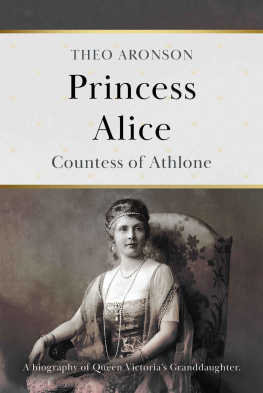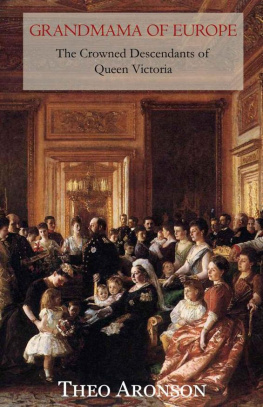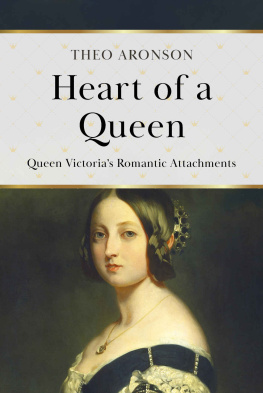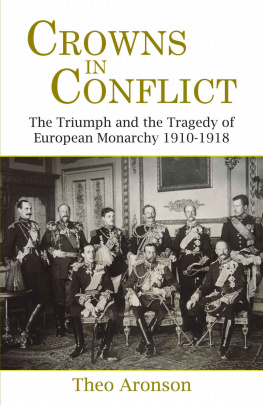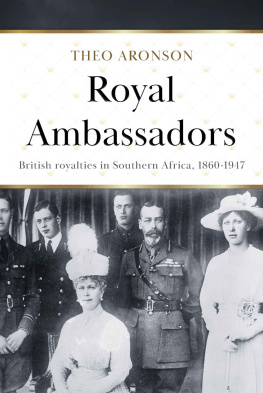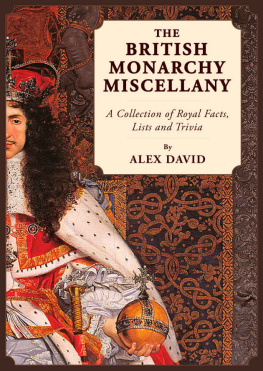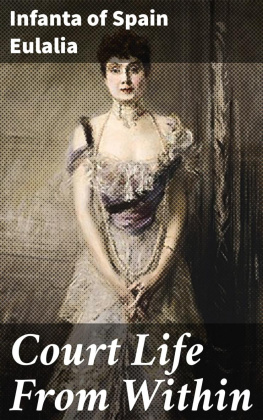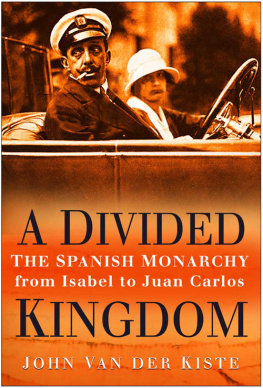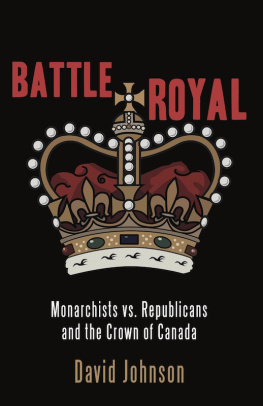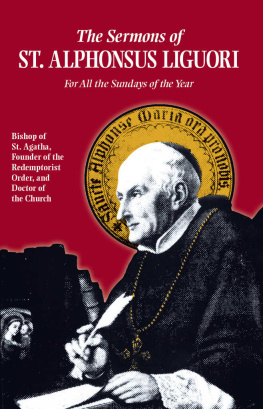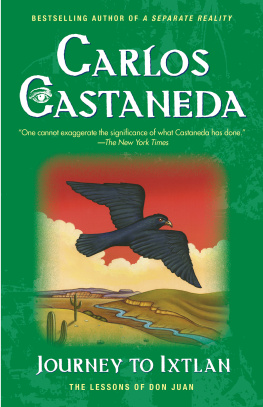ROYAL VENDETTA
The Crown of Spain
1829-1965
Theo Aronson
First published by Oldbourne Book Co. Ltd. In 1966
Copyright The Estate of Theo Aronson 1966
This edition published in 2020 by Lume Books
30 Great Guildford Street,
Borough, SE1 0HS
The right of Theo Aronson to be identified as the author of this work has been asserted by them in accordance with the Copyright, Design and Patents Act, 1988.
All rights reserved. No part of this publication may be reproduced, stored in a retrieval system, or transmitted in photocopying, recording or otherwise, without the prior permission of the copyright owner.
for Brian Roberts
Table of Contents
AUTHORS NOTE
This is the story of a family feud and of the people who played their part in it; it is not a history of the last century of Bourbon rule in Spain. To separate the two things, however, is not always easy. The turbulent personal lives of the Spanish Bourbons were always closely interwoven with the no less turbulent politics of their country. Although the sovereigns of nineteenth-century Spain were, in theory, constitutional monarchs, they were rarely so in practice, and the rivalry between the two branches of the royal house plunged Spain into two major and several minor civil wars. Nevertheless, it is on the personal rather than public careers of the later Spanish Bourbons that this study is focused; this is a book about people, not politics. It is a domestic drama played out against the background of a national one.
I have received a great deal of help during the writing of this book. I must thank Don Ernesto La Orden, Minister in charge of Cultural Affairs at the Spanish Embassy in London; Signor Oscar de Incontrera for a great deal of valuable information on the Carlist kings; Count Vittorio Cini for allowing me to see over the Palazzo Loredan in Venice; Dr. Anna Benna of the Haus-Hof-und Staatsarchiv, Vienna, for details of the death and burial of Don Alfonso Carlos. My thanks also to Signor A. Casali, British Consul at Trieste, Don J. Almudevar of the Biblioteca Nacional in Madrid, Don Manuel Garcia-Miranda, Mr. Sacheverell Sitwell, Monsignor Crea, M. Gerard Wm. Souhami, Mr. C. W. Musgrave, O. B. E., Mrs. Gabrielle Prehn, Miss M. I. Dingle, Miss Y. dOrleans, Miss Elizabeth Dey, Mr. and Mrs. S. Bartlett, Mr. D. MacAndrew and Mr. J. McIntosh.
I am deeply indebted to the Oficina de Informacin de la Direccin General del Turismo, whose officials, throughout Spain, have given me so much assistance. I am grateful also to those many people who, during my stay in Spain and on my journeys through Austria and Italy, have gone out of their way to help me. I appreciate the interest shown by the staffs of the Biblioteca Nacional, Madrid; the Spanish Institute Library, the Hispanic Council Library and the British Museum, London; the Biblioteca Civica, Trieste; the Biblioteca Nazionale Marciana, Venice; the Muse Basque, Bayonne; the South African State Library and the Public Library, Port Elizabeth.
My final thanks are for Miss Carol Mason who typed my manuscript so beautifully and so efficiently, and for Mr. Brian Roberts who has aided, advised, and encouraged me every step of the way.
T. A.
Estella, Spain
1965
PART ONE
THE REGENT
Maria Cristina of Naples
CHAPTER ONE
King Ferdinand VII, having ruled Spain with extraordinary ineptitude for fifteen years, found himself at the age of forty-five without a direct heir. Having hung onto his crown through numberless vicissitudes, he was still, in the year 1829, without a son of his own to whom he could pass it on. This was not for any want of trying. If not exactly uxorious, Ferdinand VII was at least a dutiful husband, but of his three wives, not one had presented him with a child who had lived longer than a few months. His first wife, a consumptive princess of Naples, was rumored to have been murdered by her mother-in-law. His second, a needle-plying princess of Portugal, died in childbirth. His third, a princess of Saxony described by Longfellow as being eaten up with the most gloomy religious frenzy, finally succumbed to it in 1829. Although still in his forties at the time of her death, Ferdinand was so crippled with gout and so prone to fits of apoplexy that the chances of his producing an heir seemed remote.
His anxiety to continue his line was shared by a great many of his subjects. For all his failings, Ferdinand did enjoy some sort of popularity. Although his youthful nickname, the Desired, had been replaced by some less complimentary epithets with the passing of time, his vices were not such as to upset the majority of Spaniards. His cruelty, his despotism, his religious intolerance were not qualities likely to disturb a people who had shouted Death to liberty and long live Fernando! on his return to Spain after a long imprisonment by Napoleon. Viva el Rey Absoluto! a cry ringing strangely in the liberal dawn of the nineteenth centurywas nevertheless a cry that rang out frequently in the Spain of Ferdinand VII.
The opponents of Ferdinands regimethe Liberalswere forced, willy-nilly, to share their sovereigns anxiety to produce an heir. The alternative was so much worse. For if Ferdinand VII died without issue, the crown of Spain would pass to his younger brother, Don Carlos. And if Ferdinand, in the eyes of enlightened Spaniards, was the devils disciple, then Don Carlos was the devil himself.
It was a judgment that would have shocked Don Carlos; he considered himself to be very much on the side of the angels. Pious to the point of bigotry, narrow to the point of fanaticism, he was the darling of the Spanish ultramontanes. He is more Catholic, they quipped in Madrid, than the Pope, and more Royalist than the King. There had developed in Spain during the 1820s a party of extreme reaction, violently opposed to Ferdinands slight, if enforced, softening toward the Liberals, and in Don Carlos they found a champion. Determined to snuff out liberalism and to re-establish the Inquisition (that most august tribune, brought down by angels from heaven to earth), these extremists now looked to Don Carlos as their representative. When the University of Cervera opened a loyal address with the words, Far from us the dangerous novelty of thinking! it was to him they were appealing. The Society of the Exterminating Angel, as one branch of these fanatics picturesquely called themselves, placed all their sinister energies at his disposal. In 1825 there was an abortive rising in his favor, and two years later the Federation of Pure Royalists issued a fiery manifesto, advocating his elevation to the throne. Throughout these turbulent years Don Carlos himself remained aloof. That he had every sympathy with the Apostolic and Absolutist party there is no doubt, but loyalty to his brotheror rather, the crownand the conviction that he would anyway inherit the throne, kept him out of the political maelstrom.
If the creed of Don Carlos fulfilled ones expectation of an imperious monarch, his looks certainly did not. In a family renowned for its ugliness, none was more so than he. My eldest son, Queen Maria Luisa (herself the plainest of queens) once said of Ferdinand to Lady Holland, you will find ugly; he is the counterpart of myself. The Queen could have widened this verdict to embrace all her childrenof whom the energetic lady had fourteenand it was certainly true of her second son, Don Carlos. Small, almost dwarfish, he had inherited all his mothers more grotesque features and none of her grace. He had the jutting Bourbon chin, the long Bourbon nose; his mouth was an uncompromising slit topped by a wispy moustache; his eyes were dark but without allure. It was, because of its very ugliness, a strong face, and as such belied the real character underneath.
For Don Carlos de Bourbon was weak, pitifully weak. What at first seemed like strengths of characterhis unquestioning faith, his refusal to compromisewere, in fact, weaknesses. His faith was mere obscurantism, his firmness ignorance. Henry Greville spoke of him as an imbecile, with whom nothing was to be done, bigoted and perverse, and in the hands of men as narrow-minded as himself, a coward too, and without a spark of energy or talent. It was an opinion that was to be echoed time and again by those with whom Don Carlos came in contact, and which was to be borne out by his behavior in the years ahead.
Next page


